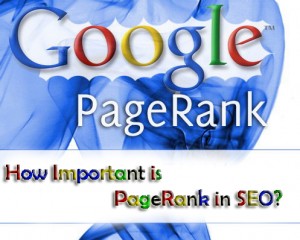How Important is PageRank in SEO?
Posted on Jul 6, 2011 in SEO | 0 comments
 “PageRank” is not the same as Search Engine Results Page (SERP) Rank. The latter refers to whether you show up as the first result in response to a specific Google query, or the fifth, or the twentieth, etc. The former, PageRank, is one of over 200 factors Google uses to rank pages.
“PageRank” is not the same as Search Engine Results Page (SERP) Rank. The latter refers to whether you show up as the first result in response to a specific Google query, or the fifth, or the twentieth, etc. The former, PageRank, is one of over 200 factors Google uses to rank pages.
PageRank has many flaws, but in general is a complicated formula to determine a web page’s reputation based on the number and quality (as judged by PageRank) of pages linking to it. Matt Cutt’s post on PageRank Sculpting gives an overview of how PageRank works.
How important is it to getting to the front page of Google?
SEOmoz crunched some numbers and wrote an article stating that PageRank has a 0.18 correlation with SERP. This is a low correlation, meaning that while it is not worthless, it doesn’t provide much value. Note, however, that is using the value that was the PageRank value displayed in the Google Toolbar, which Google only updates several times a year. In other words, Google uses a more accurate value internally.
On the other hand, Google states flat out, “don’t bother thinking about [PageRank].”
Some point out that PageRank can be a good indicator of the quality of incoming links, but that doesn’t mean the number itself is important.
To put it another way: there’s no point in struggling to improve your PageRank directly. If something you do happens to boost your PageRank, that’s great… but there’s no direct value in improving PageRank.



